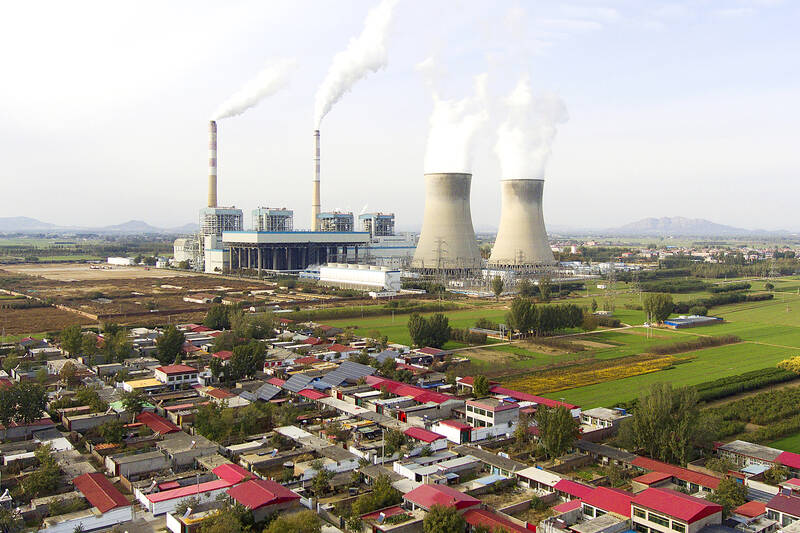China’s power industry began construction on nearly 100 gigawatts of new coal plant capacity last year, the most in nearly a decade, a report from two clean-energy groups said yesterday.
The development raises concerns about the country’s ability to meet its carbon reduction goals and threatens to undercut China’s massive expansion in solar and wind power, which has far outpaced that in the US and Europe, the report said.
“Instead of replacing coal, clean energy is being layered on top of an entrenched reliance on fossil fuels,” it said.

Photo: AP
The report is part of a review of China’s coal projects done every six months by the Europe-based Centre for Research on Energy and Clean Air and the US-based Global Energy Monitor.
Construction began on 94.5 gigawatts of coal power plant capacity last year, more than in any year since 2015, according to a worldwide database of coal plants maintained by Global Energy Monitor.
Work also resumed on 3.3 gigawatts of suspended projects, the report said.
“A substantial number of new plants will come online in the next 2-3 years, further solidifying coal’s role in the power system,” it said.
The concern is that coal power would displace solar and wind capacity. The report said that in the last three months of last year, electricity generation from fossil fuels remained high, while solar and wind use dropped sharply.
Chinese President Xi Jinping (習近平) announced two climate goals in 2020 — a peak in carbon emissions by 2030 and reaching carbon neutrality by 2060.
China’s carbon emissions might have already peaked and the next challenge is to begin reducing them, analysts have said.
The report from the clean energy groups said that China accounted for 93 percent of construction starts globally for coal power plants last year.
Proposals for new or revived coal plant projects in China fell last year to 68.9 gigawatts from more than 100 gigawatts the two previous years, suggesting that construction starts could slow, report said.

MONEY GRAB: People were rushing to collect bills scattered on the ground after the plane transporting money crashed, which an official said hindered rescue efforts A cargo plane carrying money on Friday crashed near Bolivia’s capital, damaging about a dozen vehicles on highway, scattering bills on the ground and leaving at least 15 people dead and others injured, an official said. Bolivian Minister of Defense Marcelo Salinas said the Hercules C-130 plane was transporting newly printed Bolivian currency when it “landed and veered off the runway” at an airport in El Alto, a city adjacent to La Paz, before ending up in a nearby field. Firefighters managed to put out the flames that engulfed the aircraft. Fire chief Pavel Tovar said at least 15 people died, but

LIKE FATHER, LIKE DAUGHTER: By showing Ju-ae’s ability to handle a weapon, the photos ‘suggest she is indeed receiving training as a successor,’ an academic said North Korea on Saturday released a rare image of leader Kim Jong-un’s teenage daughter firing a rifle at a shooting range, adding to speculation that she is being groomed as his successor. Kim’s daughter, Ju-ae, has long been seen as the next in line to rule the secretive, nuclear-armed state, and took part in a string of recent high-profile outings, including last week’s military parade marking the closing stages of North Korea’s key party congress. Pyongyang’s official Korean Central News Agency (KCNA) released a photo of Ju-ae shooting a rifle at an outdoor shooting range, peering through a rifle scope

South Korea would soon no longer be one of the few countries where Google Maps does not work properly, after its security-conscious government reversed a two-decade stance to approve the export of high-precision map data to overseas servers. The approval was made “on the condition that strict security requirements are met,” the South Korean Ministry of Land, Infrastructure and Transport said. Those conditions include blurring military and other sensitive security-related facilities, as well as restricting longitude and latitude coordinates for South Korean territory on products such as Google Maps and Google Earth, it said. The decision is expected to hurt Naver and Kakao

Gaza is rapidly running out of its limited fuel supply and stocks of food staples might become tight, officials said, after Israel blocked the entry of fuel and goods into the war-shattered territory, citing fighting with Iran. The Israeli military closed all Gaza border crossings on Saturday after announcing airstrikes on Iran carried out jointly with the US. Israeli authorities late on Monday night said that they would reopen the Kerem Shalom crossing from Israel to Gaza yesterday, for “gradual entry of humanitarian aid” into the strip, without saying how much. Israeli authorities previously said the crossings could not be operated safely during